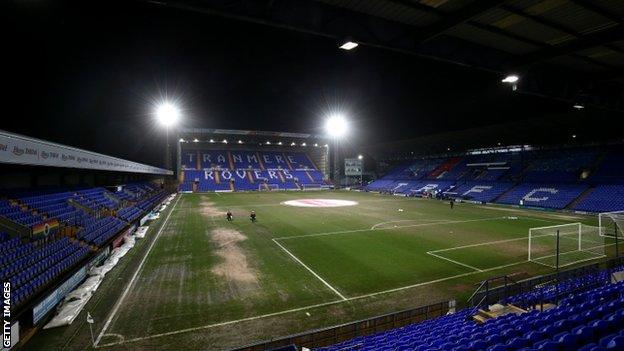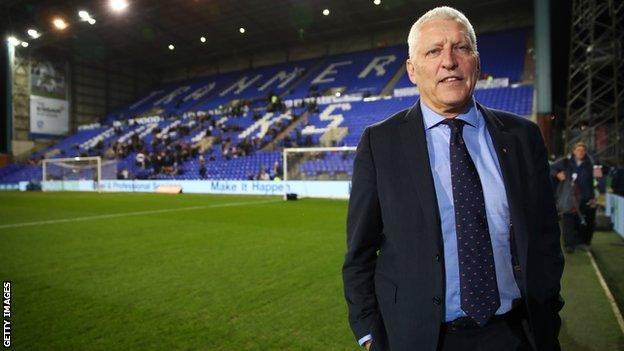Coronavirus: Financial impact of measures on EFL clubs could be 'devastating'
- Published

Tranmere Rovers chairman Mark Palios says it would cost his club up to £500,000 if games were played behind closed doors for the rest of the season
Sport around the world is taking measures to prevent the spread of coronavirus, with events taking place without spectators and even being postponed.
But what is the financial cost to teams when games are played behind closed doors, and does that even matter given the wider health concerns?
In football, Italy's Serie A or England's Premier League might be able ride out any shortfall because TV income rather than ticket sales make up the bulk of their revenue.
Teams further down the football ladder rely on gate receipts to a far greater degree - and for a club that already has financial problems, it could lead to dire consequences.
Portsmouth chief executive officer Mark Catlin says the impact on clubs in League One and League Two could be "devastating".
EFL representatives also made clear to the government at a meeting on Monday that insurance policies would come nowhere near covering such losses.
Mark Palios, chairman of League One Tranmere Rovers, says many clubs "operate hand to mouth" and playing games without crowds for the rest of the season could cost his team up to £500,000 in lost income.
But Accrington Stanley owner Andy Holt, whose club are 17th in the same division, says: "I am really concerned [by the financial impact] but not as concerned as I would be about getting a grip on this coronavirus crisis. I think we need to get on top of it.
"It is OK talking about financial ramifications. If I lose half of my fans to this disease, I have long-term financial ramifications that may be far more critical."
What is the financial cost?
League One Bury were expelled from the Football League in August and Bolton Wanderers suffered a points deduction after going into administration in May, while Macclesfield Town and Southend United have been charged for not paying their players this season.
The prospect of losing gate receipts for the remaining games this season might "tip others over the edge", according to Catlin.
David Bottomley, the chief executive of League One Rochdale, says playing behind closed doors would be a "huge issue from a financial perspective" and, with six home games remaining, could cost up to £200,000.
That would include home and away fans who pay for their tickets on the day, and takings from bars and hospitality services.
Catlin, whose Portsmouth team has 14,500 season ticket holders, estimates that losses would amount to £100,000 a game. In addition, if games are played without crowds, the club faces the potential of compensating or crediting its season ticket holders.
One Championship chief executive told BBC Sport the uncertainty might also have an impact on season ticket sales next year.
Palios says matchday losses at Tranmere could be "between £250,000 and £300,000" for the remainder of the season.
He added: "You are probably looking at a total loss of £400,000 to £500,000, which would be unbudgeted and unwelcome."
What impact could that have?
Catlin, who will lead his team to the EFL Trophy final next month against Salford, says playing behind closed doors games would not be "life-threatening" for Pompey.
But he adds: "There's five or six clubs that I know over [League One and Two] who are in trouble already. It could be the difference in tipping them over the edge.
"There are clubs struggling and reliant on matchday income to pay wages at the end of the month."
Former Football Association chief executive Palios says Tranmere have enough money in the bank to save them from going under but adds: "A lot of clubs operate hand to mouth, and it may be that owners have to inject funds into the clubs."
He also hopes there is support from the wider football community. While the EFL expressed financial fears at Monday's government meeting, the Premier League is more concerned about completing its season in order to preserve the integrity of the competition.
"I'm not a great fan of handouts because you have to stand on your own two feet," Palios says. "Having said that, these are exceptional circumstances so if you are looking at real solidarity in the football world, help from the EFL, the FA and the Premier League is one of the avenues that needs to be explored.
"Equally, government is looking to support economy and business, and football clubs are part of that. There are variety of ways they could all help in that regard."

Mark Palios and wife Nicola took a controlling interest in Tranmere in August 2014
Is stopping football the right option?
England's deputy chief medical officer Dr Jenny Harries said on Tuesday that cancelling big outdoor events such as football matches would not necessarily be a decision supported by science.
"The virus will not survive very long outside," she said. "Many outdoor events, particularly, are relatively safe."
Accrington chairman Holt believes the season should be paused until the UK "gets a grip on coronavirus".
That might be concerning for fans whose teams are set to be promoted. It might also be of benefit to those clubs in the relegation zone.
But Holt maintains safety should come first. He says: "I am walking round our club at the weekend and there are 3,000 fans there and I am worried that inviting them altogether at our place is actually putting them in danger. Why would I do that?
"I have a lot of friends in Italy and they are telling me that the Italian government hasn't done enough."
Palios, whose team are in the League One relegation zone, says a wider perspective is needed.
"You are always cognisant of where you fit in the scheme of things and what you have to do is comply with best advice. If the government decide, in their wisdom, that means the cancellation of the season then so be it."
Catlin does not see that happening because of the knock-on effect it would have on the summer and the start of next season. In that sense, he regards games behind closed doors as "the lesser of two evils".
As to whether clubs would challenge the cancellation of the season in court, Palios adds: "I don't think clubs will do that. If they do, they have to mount a legal challenge against the government. I don't think any sensible person will look at that."